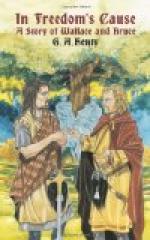The castle was as usual levelled to the ground, and as the stronghold of Carlaverock soon afterwards surrendered, the districts of Tweeddale and Galloway were now completely cleared of the English, with the exception of the Castle of Jedburgh, which they still held.
Randolph had been created Earl of Moray, and after establishing himself in his new earldom he had returned with his feudal followers and laid siege to Edinburgh, whose castle was considered all but impregnable. It had been in the possession of the English ever since it was captured by Edward I in 1296, and was strongly garrisoned and well provisioned.
Even when joined by Archie Forbes and his retainers Randolph felt that the castle could not be captured by force. The various attempts which he made were signally foiled, and it was by stratagem only that he could hope to carry it. The news of the capture of Roxburgh by Douglas increased his anxiety to succeed. Accompanied by Archie he rode round the foot of the steep rock on which the castle stands, eagerly scanning its irregularities to see if by any possibility it could be scaled.
“I would give a brave reward,” he said to Archie, “to any who could show us a way of climbing those rocks, which, methinks, even a goat could scarcely manage to ascend.”
“I can tell you of a way,” a Scotch soldier who was standing a few paces off when he made the remark, said, saluting the earl. “It needs a sure foot and a stout heart, but I can lead a score of men with such qualifications to the foot of yonder walls;” and he pointed to the castle rising abruptly from the edge of the rocks.
“If you can make good your word, my brave fellow,” Randolph said, “you may ask your own reward, and I pledge you my word, that if it be aught in reason it shall be granted. But who are you, and how did it come that you know of a way where none is supposed to exist?”




